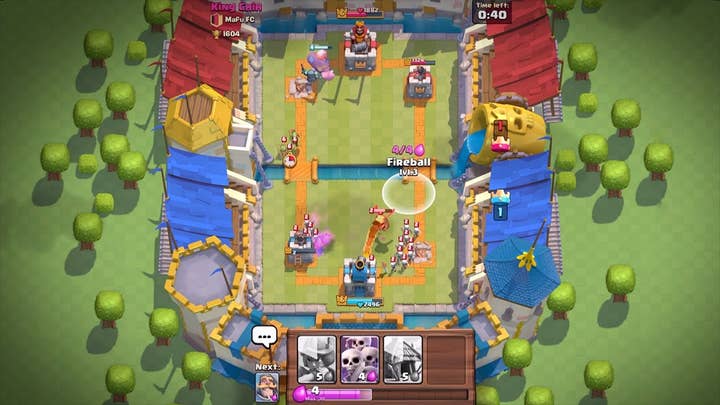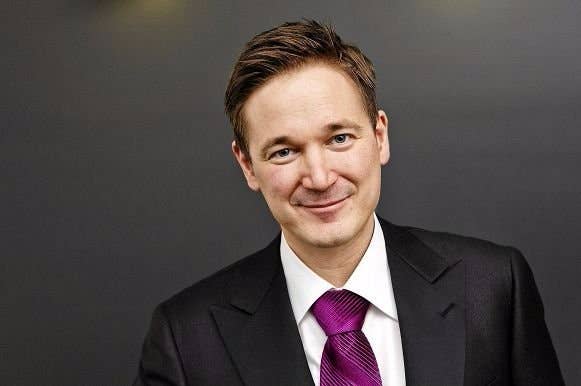"My biggest nightmare is waking up and realising we've not failed in a year"
Ilkka Paananen talks company culture ahead of this year's annual BAFTA lecture.
Supercell CEO Ilkka Paananen has spoken to GamesIndustry.biz about the core values of his company's culture, offering a substantial insight into the day to day operation of one of the world's most successful gaming companies.
Paananen was speaking in advance of the annual BAFTA games lecture, where he spoke about the processes behind the phenomenal success of titles like Clash of Clans, a perennial feature in the upper echelons of the mobile charts. That lecture can be watched in full below.
"The truth is that I'm not a game developer," said Paananen in our interview. "Obviously I'm passionate about games, and I'm a big gamer, but my other passion is creating organisations, it's the teams who build the games. Our big breakthrough at Supercell was deciding to make the developers the superstars rather than the CEO or a creative director dictating what the company should do. Let's enable them to make the best possible games. Our mission is remove every possible obstacle to that to try and make these teams successful.
"Our big breakthrough at Supercell was deciding to make the developers the superstars rather than the CEO or a creative director dictating what the company should do."
"But the biggest misconception of the Supercell culture is that it is a small happy family where people just have fun and can do whatever they want, not caring about the results. Nothing could be further from truth. We set the bar extremely high."
A huge factor in the creation of an environment which sponsors responsibility is transparency, says Paananen. Every morning, full metrics on each of the company's games are shared throughout the firm via email, meaning that there's nowhere to hide should your game's KPIs not be up to scratch. Although this breeds a competitive atmosphere, Paananen says it also fosters an ownership of mistakes and success.
"If players aren't liking a game, you can very easily spot that via the metrics," he says. "Obviously that can create a high-pressure environment, but the people who are the right fit for Supercell love that. They can focus on creating the biggest possible impact - there shouldn't be anything in their way. If there is, it's our job to remove it."
Sharing metrics isn't done to shame staff, but to share knowledge - to establish best practices and enable everyone to benefit from that, no matter which discrete development team, or Cell, they're part of. Whilst it's easy enough to monitor what's working once a game is live, another key factor in maintaining the high standards of the company is making people comfortable with killing those games which aren't working well before they hit the market. The decision to do so sits entirely within the team working on that project, says Paananen, but how do they make that call in the absence of KPI feedback?
"When you're developing a game, it's only the game team who can decide to kill that project, nobody else, including myself"
"That's the hard part! When you have a live game, you can't argue with the numbers, the facts. When you're developing a game, it's only the game team who can decide to kill that project, nobody else, including myself. It's about the gut feeling of the team. Of course, they sometimes do user testing, but that's just one data point. The best indicator is the gut feeling of the team, how excited they are. Sometimes we say there are two groups of people with power at Supercell. When a game is in development, it's the team. Once it's live, that power all shifts to the players.
"There have been a lot of press stories about how we celebrate failure with champagne, but I think that's a misleading picture of that process. Trust me, it's not fun to kill a game you've worked on for six or nine months, day and night. It's your baby. What we're celebrating with that champagne isn't the failure itself, but the lessons we've learned from it. We try to create an environment where it's safe to fail. My biggest nightmare is waking up and realising we've not failed in a year - that means we're not taking enough risks."
That ethos extends beyond the boardroom of Supercell itself. When the company was acquired by Softbank, some feared that the new owners would interfere with the magic formula, particularly by trying to force the company to make games directly for the Asian market. However, those fears were unfounded, with Softbank being wise enough not to smother the golden goose. With the recent sale of Softbank's stake to Chinese giant Tencent, has that attitude endured?
"Very much so," says Paananen. "Obviously when we did the Softbank deal, it wouldn't even have happened if we didn't feel very strongly that this would be the case, and now Tencent has replaced them, the same thing has carried over."

Paananen also says that the decision of who their new owner would be was put very firmly in Supercell's own hands, with Softbank giving the balance of power in the decision making process over to Supercell's board almost completely. In fact, it was Paananen and his team who made the final decision about who the new management would be.
"Even as a minority shareholder under Softbank, the founders had complete control," he reveals. "Basically how it happened was that just over a year ago we got the call from Softbank, explaining that the situation was such that they needed some cash and that if we could find a new home for ourselves they would be happy to sell. So we said OK. It wasn't something I was expecting to hear, but I understand that in business situations change, so we knew that looking forwards was the best idea.
"Obviously, that's a huge decision, and we spent a long time evaluating all of the candidates, but at the end of the day it was a surprisingly easy choice, largely because their philosophy was was very very close to Softbank's."
The 'Cells' operating within the company are given almost free-reign to pick and choose projects and how far they go along the road to market, but there's also no denying that Supercell very much has a trademark style - with free-to-play, competitive and mobile-based seemingly the core principles of all of its game design. We asked Paananen how those guidelines are applied to such a free-flowing creative process, and whether there was scope for teams to move beyond them should the right idea come along.
"in ten years time, maybe there's another platform that does that better. Who knows what that will be, but we'll be ready to consider it"
"When we founded the company we had certain principles in place. One of those was that we wanted to create games that people played for a long time. Games as services you carried in your pocket. Our dream was that people would play not just for years but decades. We wanted to make games for the largest number of people. A couple of years ago we actually documented that and those ideals are still very much alive. We believe that free-to-play and mobile are the best ways to do that.
"But in ten years time, maybe there's another platform that does that better. Who knows what that will be, but we'll be ready to consider it."
One of the most enduring, and revealing, stories about Supercell's philosophy is the behaviour of the management after the Softbank acquisition. Having become millionaires many times over overnight, the company's leadership took out a double page spread in a Finnish newspaper, explaining how proud they were to be a part of a country which had enabled this level of success and promising to give back accordingly.
Indeed, there's a point of company pride that its executives use no form of 'tax efficiency', simply paying their due to the government in full. As a result, both Paananen and his co-founders are massive contributors to the Finnish economy, setting a tremendous example to both staff and contemporaries. But it that social responsibility an extension of the company culture of freedom and responsibility?
"I guess so," Paananen admits, with considerable humility. "I think we've been ridiculously lucky with our lives. It feels great to be able to help others. Finland as a country...economically it's not doing great at the moment. If we're able to contribute and help the country we came from, to help a country which provides such excellent free education and healthcare - it feels really good. It makes us happy and proud. It's the right thing to do."
The transcript for this article comes from a roundtable interview with Ilkka Paananen conducted alongside the Guardian.

